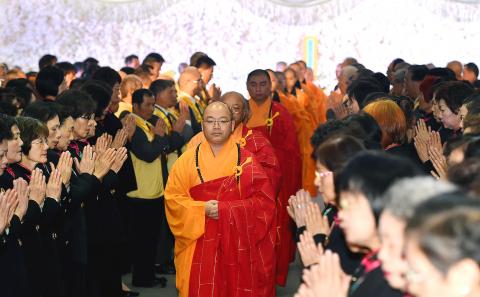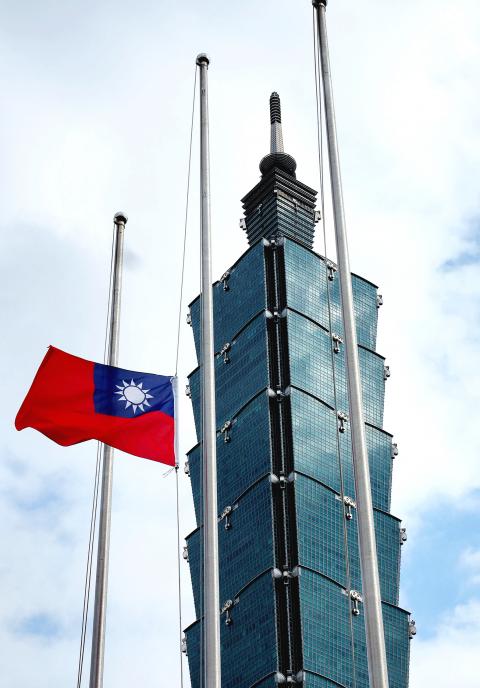The Civil Aeronautics Administration (CAA) is today scheduled to release the results of the first-stage re-examination of TransAsia Airways’ pilots on their knowledge of operating ATR 72-type aircraft, saying that some had failed the test.
The agency said those passing the oral test would go on to the second stage of retraining, in which pilots would be sent overseas to undergo training on flight simulators.
Pilots would be grounded if they fail any of the tests and would be given one month to retrain themselves before taking the tests again, the agency said.

Photo: Liao Chen-huei, Taipei Times
According to the CAA, the airline has 71 pilots in charge of operating ATR 72-type airplanes.
The order requiring them to retake the test on operating the airplanes was issued after TransAsia Airways Flight GE235 crashed into the Keelung River in Taipei on Wednesday last week, killing 40 people aboard the plane and injuring 15 others. Rescuers were still looking for three missing victims as of press time yesterday.
The fatal disaster was the airline’s second within seven months — both involving ATR 72-type planes. On July 23 last year, TransAsia Flight GE222, an ATR 72-500 aircraft, crashed in a village near Magong Airport in Penghu.

Photo: EPA
Officials decoded the data recorded on Flight GE235’s flight data recorder and cockpit voice recorder and found the No. 2 engine went into feathered mode soon after the flight took off, triggering a master warning in the cockpit.
Rather than turning off the No. 2 engine, the pilots appeared to have shut down the No. 1 engine, which was working normally at the time. The plane then plunged into the river after the engines failed to produce enough thrust to keep the aircraft airborne.
The CAA yesterday confirmed that the control tower at Taipei International Airport (Songshan airport) did not hear the “Mayday” signal sent out by the pilots, as the signal was muffled by noises generated when the pilots and control tower called one another at the same time.
CAA air traffic control department director Lee Jian-kuo (李建國) said the pilots were supposed to contact the approach control officers after the aircraft reached an altitude of 244m to 305m.
Lee said they did not do so, causing the approach control officers to call the control tower.
“When the control tower tried to contact the aircraft at 10:53am on Wednesday last week, the flight happened to call out to the control tower at the same time, which produced noises during the communication, explaining why the control tower did not hear the Mayday signal,” Lee said, adding that officials were not aware of this until they transcribed the conversations.
The transcript has been turned over to the Aviation Safety Council as part of the crash investigation, Lee said.
Meanwhile, President Ma Ying-jeou (馬英九) yesterday led a group of Cabinet officials in mourning those killed in the crash at a public funeral service in Taipei.
Ma bowed before an altar set up at the Taipei Second Funeral Parlor, then delivered his condolences to the victims’ families.
Government agencies across the nation flew the national flag at half-mast to mourn the victims.
Additional reporting by CNA

Several Chinese Nationalist Party (KMT) officials including Chairman Eric Chu (朱立倫) are to be summoned for questioning and then transferred to prosecutors for holding an illegal assembly in Taipei last night, the Taipei Police said today. Chu and two others hosted an illegal assembly and are to be requested to explain their actions, the Taipei City Police Department's Zhongzheng (中正) First Precinct said, referring to a protest held after Huang Lu Chin-ju (黃呂錦茹), KMT Taipei's chapter director, and several other KMT staffers were questioned for alleged signature forgery in recall petitions against Democratic Progressive Party (DPP) legislators. Taipei prosecutors had filed

Taiwan would welcome the return of Honduras as a diplomatic ally if its next president decides to make such a move, Minister of Foreign Affairs Lin Chia-lung (林佳龍) said yesterday. “Of course, we would welcome Honduras if they want to restore diplomatic ties with Taiwan after their elections,” Lin said at a meeting of the legislature’s Foreign Affairs and National Defense Committee, when asked to comment on statements made by two of the three Honduran presidential candidates during the presidential campaign in the Central American country. Taiwan is paying close attention to the region as a whole in the wake of a

NEW WORLD: Taiwan is pursuing innovative approaches to international relations through economics, trade and values-based diplomacy, the foreign minister said Taiwan would implement a “three-chain strategy” that promotes democratic values in response to US tariffs, Minister of Foreign Affairs Lin Chia-lung (林佳龍) said. Taiwan would aim to create a “global democratic value chain,” seek to capitalize on its position within the first island chain and promote a “non-red supply chain,” Lin was quoted as saying in the ministry’s written report to the Legislative Yuan submitted ahead of the legislature’s Foreign Affairs and National Defense Committee meeting slated for today. The Ministry would also uphold a spirit of mutual beneficial collaboration, maintaining close communication and consultations with Washington to show that Taiwan-US cooperation

Taiwan and the US have begun trade negotiations over tariffs imposed by US President Donald Trump earlier this month, Minister of Foreign Affairs Lin Chia-lung (林佳龍) said in an interview this morning before reporting to the Legislative Yuan’s Foreign Affairs and National Defense Committee. The Taipei Economic and Cultural Representative Office (TECRO), Taiwan’s de facto embassy in the US, has already established communication channels with the US Department of State and the US Trade Representative (USTR), and is engaging in intensive consultations, he said. Points of negotiation include tariffs, non-tariff trade barriers and issues related to investment, procurement and export controls, he